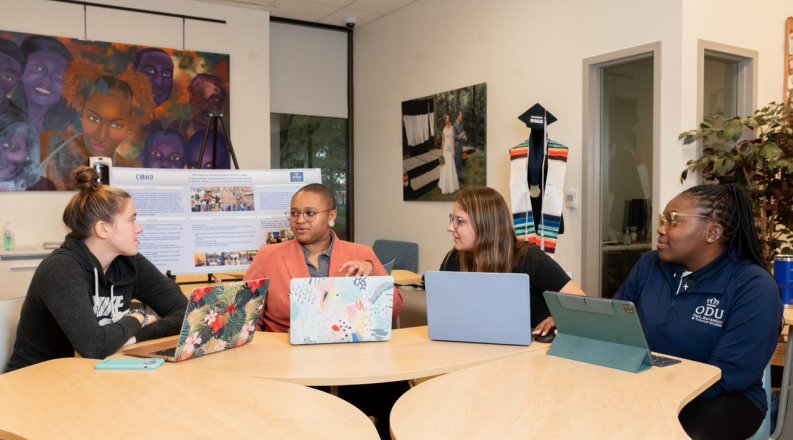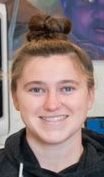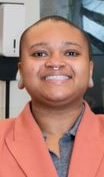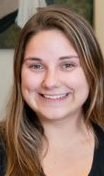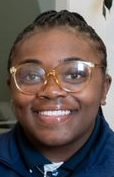The four Old Dominion University students who last fall oversaw the Perry Honors College’s Undergraduate Research Apprenticeship class took different routes to their involvement. The research generated from the course helps inform ODU’s Recreate, Educate, Advocate and Climb Higher (REACH) program, one of the nation’s only year-round recreation programs for youth with type-1 diabetes.
For Bethany Arrington and Taylor Harvey, it was personal. They both have type 1 diabetes.
For Rowan Williams, who had earned a bachelor’s in information systems and technology, it was seeing a presentation by Eddie Hill, ODU’s former director of undergraduate research who created the REACH program, as they were considering master’s degree options.
For Alexis Barmoh, it was receiving information about REACH from her advisor at Radford University.
But they all agree that the experience has been incredibly rewarding.
“I found my calling, definitely,” said Arrington, who entered college on an entirely different career path. “I feel like everything happens for a reason.”
Diabetes is a significant problem in the United States. According to the Centers for Disease Control and Prevention (CDC), 37.3 million Americans (11.3% of the population) have diabetes, including 8.5 million who are undiagnosed.
Type 1 diabetes, which is primarily diagnosed in teens and young adults, is believed to be caused by an autoimmune reaction that causes the body to attack itself. Symptoms usually come on quickly, and there’s no known way to prevent it.
Hill said one in 400 kids are diagnosed with type 1 diabetes (T1D). To help this population, Hill launched recreation programs for youth with T1D at ODU in 2006. The first was a partnership with the Lions Family Diabetes Camp, a three-day overnight camp for children ages 6 to 17 at Triple-R Ranch in Chesapeake. Over the ensuing years, these umbrella recreation services evolved into one program called REACH. They include the Family Diabetes Camp (with the Lions Club 24-I), Monthly Hangout (held on select Saturdays for ages 10 to 16) and ODU Tween/Teen Diabetes Camp (a five-day summer camp for ages 11 to 17). The newest camp, Lil’ REACH for ages 6 to 9, starts March 25. Parents and family members are encouraged to participate. The latter three camps are held at ODU.
“Many of our kids are not eligible to go to traditional camps,” Hill said. “From many of our parents, we often get these testimonials – ‘Thank you so much for what you do’ – because there are no other services for these kids.”
The Lions Club 24-I and Lions Club International Foundation provide funding.
“It’s completely free,” Hill said. “We offset some of the other costs for ODU with in-kind things. We use the rock wall, the pool and things like that for recreational activities that promote healthy lifestyles.”
Harvey, who like the other students leading the research class volunteered with the REACH program, can attest to the value of the camps. She participated in the family diabetes camp when she was 11 – four months after receiving her diagnosis.
“It really creates a sense of belonging for them,” said Harvey, who graduated with a bachelor’s in exercise science in December. “And it creates a time where they can just be kids without having to think of all the things that you deal with with diabetes.”
The Undergraduate Research Apprenticeship: REACH (Honors 226) launched in the fall 2021 semester as a pilot research course. Hill said Honors College students from various majors are recruited for the class. “They all have some vested interest either in health care or youth or societal issues and are also interested in being young scholars,” Hill said.
Williams, a Ph.D. student in sport and recreation management who plans to graduate in May 2024, was the primary instructor this past fall. Barmoh, a master’s candidate in parks, recreation and tourism who will graduate in May, is Williams’ teaching assistant. Harvey was a peer teaching assistant. Arrington, who was a teaching assistant in the fall 2021 semester, acted as the connection between the REACH program and the class.
The research goal of the course appealed to the course leaders.
“I see everything as some form of research,” Williams said. “Opening up the ivory towers of academia to more diverse populations, that means we can start creating and solving problems more creatively if we have more people in the space with different perspectives. I love working with students and seeing them not terrified of the word ‘research’ anymore once they finish the class and get a bit more hands-on experience and realizing that they do research all the time.”
“Looking at physical activity, there’s a ‘why’ behind it,” Barmoh added. “Why is it important? Studies have shown that it increases productivity. So, just watching the students figure out the ‘why’ behind different topics, I think that’s very rewarding seeing them progress.”
The research coming out of the class directly impacts REACH programming.
Arrington pointed out that last year they started examining camp participants’ blood-sugar biometric data using continuous glucose monitors.
“Now we’re able to replicate (activity) schedules in order to gain the most effective blood sugars for these kids,” she said.
Barmoh noted research three students in the class conducted about parents’ perspectives.
“You hear how the youth feel, how they experience bullying or different things at school, but you don’t really hear about how the parents feel,” she said. “I think that’s going to be an interesting piece to read.”
Williams, who’s been with the program the longest, said they’ve seen a needed emphasis on psychological health in light of how youths with type 1 diabetes were affected by the shift to remote learning during the pandemic.
“We’re noticing the importance of those social connections for youths,” they explained. “Conversations happening before class, conversations happening at lunchtime. How can we supplement in areas where they might not be receiving some of those social opportunities in school?”
The instructors have gained a lot of insight from the campers.
“It’s not only they’re learning from us, but we’re also learning from them because there’s never a day that you go to REACH and you don’t learn something new,” Harvey said.
At the 2022 Undergraduate Research Symposium, Harvey, Arrington and Williams presented their study titled “Friendship and Fun: Piloting a Medical Specialty Tween Day Camp.”
Hill believes the initial HNRS 226 classes have laid a solid foundation.
“The first two REACH classes help refine the program,” he said. “Now we think we have a sustainable model in place.”
The class leaders have clear ideas about their futures.
Williams, who loves teaching and research, wants to be a professor. Harvey plans to pursue a doctorate in physical therapy. Barmoh aims to become a recreational therapy professor.
Arrington will remain at ODU, something not on her radar when she started her college career at Virginia Wesleyan University.
In her mid-teens, her parents enrolled her in flight school. Her plan was to get a degree, enter the military to get more flight training for free and eventually become a commercial airline pilot.
Her diagnosis during her freshman year ended those dreams. She would have to go three years without any kind of diabetic incident before she could fly again. By that time, all the training certifications she had earned would have expired, and there would be no way to restart the process.
“I was diagnosed at 18. I was an adult, but honestly, I was still a kid,” she said. “The college experience of navigating such a complex disease where in a dorm room you’re going to have a minifridge and a microwave … I had a lot of growing up to do.
“I was stressed, frantic. I had this plan, and I could no longer do it anymore. Now I have to figure out what I want to do and how to move on.”
Still unsure of what to do, she earned a bachelor’s in sport management. She eventually learned about REACH.
And now she’s the program director, replacing Hill, who has moved on to start a similar program at Weber State University in Utah.
“I love REACH,” said Arrington, who will graduate with her master’s degree in May. “It doesn’t feel like work. I love waking up on Saturday mornings and getting to go to REACH. So I’m excited to make a career out of this opportunity.”
The research conducted by the class during the fall 2022 semester will be presented at the 15th annual Undergraduate Research Symposium, which is scheduled for 9 a.m. to 5 p.m. March 25 at the Honors College. A total of 85 students are expected to make presentations. This will be the first fully in-person symposium since 2020.



